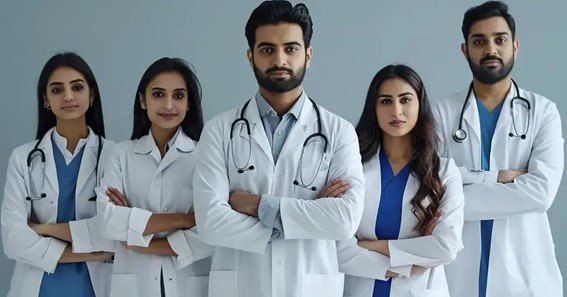MBBS full form is Bachelor of Medicine and Bachelor of Surgery. It is an essential degree in the field of medicine. Everyone aspiring to work on matters touching health self must understand what MBBS means fully.
This paper will discuss not only what quality stands for but also why this particular abbreviation is so important for doctors.
What Is MBBS Full Form?
MBBS is authoritatively known as Bachelor of Surgery and Bachelor of Medicine. It is a degree that one earns when he/she completes a full course of study in medicine and surgery, which consists of theoretical information, practical exercises tests, and academic work in different hospitals.
The students get many opportunities to apply what they learn during these periods which gives them insight into different aspects of the healthcare industry.
At the end of the MBBS course they are conferred with the title; ‘Dr’ after which they can go for postgraduate training or start working as doctors in general practice.
Importance Of MBBS
Now that it has been already established what MBBS is, it is time we discuss what exactly its importance is in modern society and what importance it holds in the field of medicine.
Foundation Of Medical Knowledge:
MBBS is where fundamental human body parts’ information like anatomy, physiology, pathology, pharmacology, microbiology, etc., are taught so that learners become acquainted with their roles in detecting and healing ailments in individuals.
The licensing requirements may differ from country to country while having a certificate from an accredited MBBS program is standard for anyone in an aspiring doctor profession across all nations.
Clinical Skills Development:
Clinical skills development is the main thing in MBBS. It entails training using hands-on skills or practical experience. Gain rich experiences in patient care, medical procedures, and health service management by taking part in clinical rotations, internships, and clerkships.
Patient Care And Diagnosis:
A Bachelor of Medicine and Bachelor of Surgery degree gives doctors the competency and knowledge necessary for complete patient management.
Doctors who graduate with an MBBS can perform physical exams as well as interpret diagnostic results in addition to coming up with ways of curing diverse illnesses
Professional Licensing:
To begin practicing medicine legally, there is a necessity to achieve a Bachelor of medicine and Bachelor of Surgery (MBBS) degree, without which one cannot get a medical license.
The licensing requirements may differ from country to country while having a certificate from an accredited MBBS program is standard for anyone in an aspiring doctor profession across all nations.
Specialization Opportunities:
Once MBBS is finished, doctors may want to go for higher degrees like MD (Doctor of Medicine) or specialized diplomas such as those in cardiology, oncology, pediatrics, and surgery at various postgraduate levels.
Community Health Impact:
Medical doctors who have completed their degree in medicine have an important part to play in enhancing the general state of health in society and solving the difficulties experienced in delivering services.
They are the first individuals to provide health services, and they help in avoiding diseases, offering education on good health practices, running programs for vaccination as well as being involved in other public health projects.
Medical Research And Innovation:
A lot of medical research is done by MBBS graduates who can advance science in healthcare. Clinical trials, medical examinations, and new healthcare solutions are some of the activities in which they can be involved because they know what goes into conducting research and the basic medical principles behind it.
Global Medical Mobility:
An MBBS degree is acknowledged worldwide, which allows health professionals to work as clinicians and find job openings in any corner of the earth. This movement helps with conversations, sharing ideas, and exploring different healthcare areas along with patient clusters.
They are the first individuals to provide health services, and they help in avoiding diseases, offering education on good health practices, running programs for vaccination as well as being involved in other public health projects.
Conclusion
MBBS at its core is an all-inclusive educational program that imparts basic information on medicine, practical skills in treatment, and moral values.
Such know-how acquired is not merely academic; it is the very platform upon which medical professionals base their medical practice for making choices as well as giving good care to their clients. The practical experience acquired in the course of studying MBBS through attachment
FAQ
How Long Does It Take To Complete An MBBS Degree?
An MBBS program takes varying time in different nations but usually lasts 5-6 years involving academic study and practical training.
They are the first individuals to provide health services, and they help in avoiding diseases, offering education on good health practices, running programs for vaccination as well as being involved in other public health projects.
Can MBBS Graduates Practice Medicine In Other Countries?
Medical licensure may be applied for by individuals with an MBBS for them to practice medicine in countries that have authorized their qualification and met licensing conditions such as passing exams and other requirements.
What Is The Difference Between MBBS And Md?
MBBS is a five-year General Medical Council-accredited undergraduate degree focused on medicine and surgery for doctors in the United Kingdom, while MD-like degree programs allow medical students to do their residencies without leaving the country.
Are There Any Entrance Exams For MBBS Programs?
Yes, a plurality of nations as well as educational establishments require aspirants to undertake entry examinations like the MCAT (Medical College Admission Test) or internal medical admission tests for eligibility to enroll in the MBBS program.
What Career Opportunities Are Available After Completing MBBS?
Newly qualified doctors have a wide range of career opportunities open to them which include general practice, various specialties as well as surgical and non-surgical subspecialties; besides these are investigative medicine; healthcare managers in government institutions; public health agents at different levels as well as teachers at colleges offering medicine.










